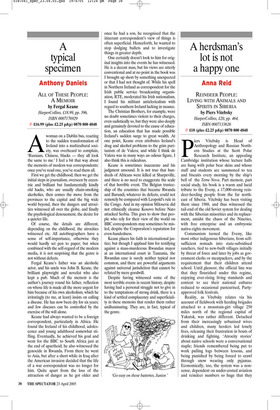A typical specimen
Anthony Daniels
ALL OF THESE PEOPLE: A MEMOIR by Fergal Keane HarperCollins, £18.99, pp. 396, ISBN 0007176929 ✆ £16.99 (plus £2.25 p&p) 0870 800 4848 Awoman on a Dublin bus, reacting to the sudden transformation of Ireland into a multicultural society, was overheard to complain, ‘Russians, Chinese, blacks — they all look the same to me.’ I feel a bit that way about the memoirs of modern war correspondents: once you’ve read one, you’ve read them all.
First we get the childhood, then we get the initial steps in journalism, overseen by eccentric and brilliant but fundamentally kindly old hacks, who are usually chain-smoking alcoholics, then comes the move from the provinces to the capital and the big wide world beyond, then the dangers and atrocities witnessed all over the globe, and finally the psychological denouement, the desire for a quieter life.
Of course, the details are different, depending on the childhood, the atrocities witnessed etc. All autobiographers have a sense of self-importance, otherwise they would hardly set pen to paper; but when combined with the self-regard of the modern media, it is not surprising that the genre is not without defects.
Fergal Keane’s father was an alcoholic actor, and his uncle was John B. Keane, the brilliant playwright and novelist who also kept a pub. Much of the memoir is the author’s journey round his father, reflection on whose life is made all the more urgent for him because of his own alcoholism, which he irritatingly (to me, at least) insists on calling a disease. He has now been dry for six years; and few diseases can be controlled by the exercise of the will alone.
Keane had always wanted to be a foreign correspondent, particularly in Africa. He found the Ireland of his childhood, adolescence and young adulthood somewhat stifling. Eventually, he achieved his goal and went for the BBC to South Africa just at the end of apartheid; he also witnessed the genocide in Rwanda. From there he went to Asia, but after a short while in Iraq after the American invasion decided that the life of a war correspondent was no longer for him. Quite apart from the loss of the attraction of danger as he got older and once he had a son, he recognised that the itinerant correspondent’s view of things is often superficial. Henceforth, he wanted to stop dodging bullets and to investigate things in greater depth.
One certainly doesn’t look to him for original insights into the events he has witnessed. He is a decent man, but his views are utterly conventional and at no point in the book was I brought up short by something unexpected or that I had not thought of. While his spell in Northern Ireland as correspondent for the Irish public service broadcasting organisation, RTE, moderated his Irish nationalism, I found his militant anticlericalism with regard to southern Ireland lacking in nuance.
The Christian Brothers, for example, were no doubt sometimes violent to their charges, even sadistically so, but they were also deeply and genuinely devoted to the cause of education, an education that has made possible Ireland’s sudden surge to great wealth. At one point, Keane even attributes Ireland’s drug and alcohol problems to the grim puritanism of de Valera; and while I think de Valera was in many ways an odious figure, I also think this is ridiculous.
Keane is sometimes inaccurate and his judgment unsound. It is not true that hundreds of Africans were killed at Sharpeville, and there is no need to exaggerate the scale of that horrible event. The Belgian trusteeship of the countries that became Rwanda and Burundi, whatever its defects, could not remotely be compared with Leopold’s rule in the Congo. And in my opinion Milosevic did not ethnically cleanse Kosovo before Nato attacked Serbia. This goes to show that people who rely for their view of the world on BBC correspondents may sometimes be misled, despite the Corporation’s reputation for even-handedness.
Keane places his faith in international justice; but though I applaud him for testifying against a mass-murderous Rwandan mayor at an international court in Tanzania, the Rwandan case is surely neither typical nor common, and there are powerful arguments against universal jurisdiction that cannot be refuted by mere goodwill.
Despite having witnessed some of the most terrible events in recent history, despite having had a personal struggle not to give in to the temptations of strong drink, there is a kind of settled complacency and superficiality in these memoirs that render them rather unilluminating. They are, in fact, typical of the genre.



















































 Previous page
Previous page